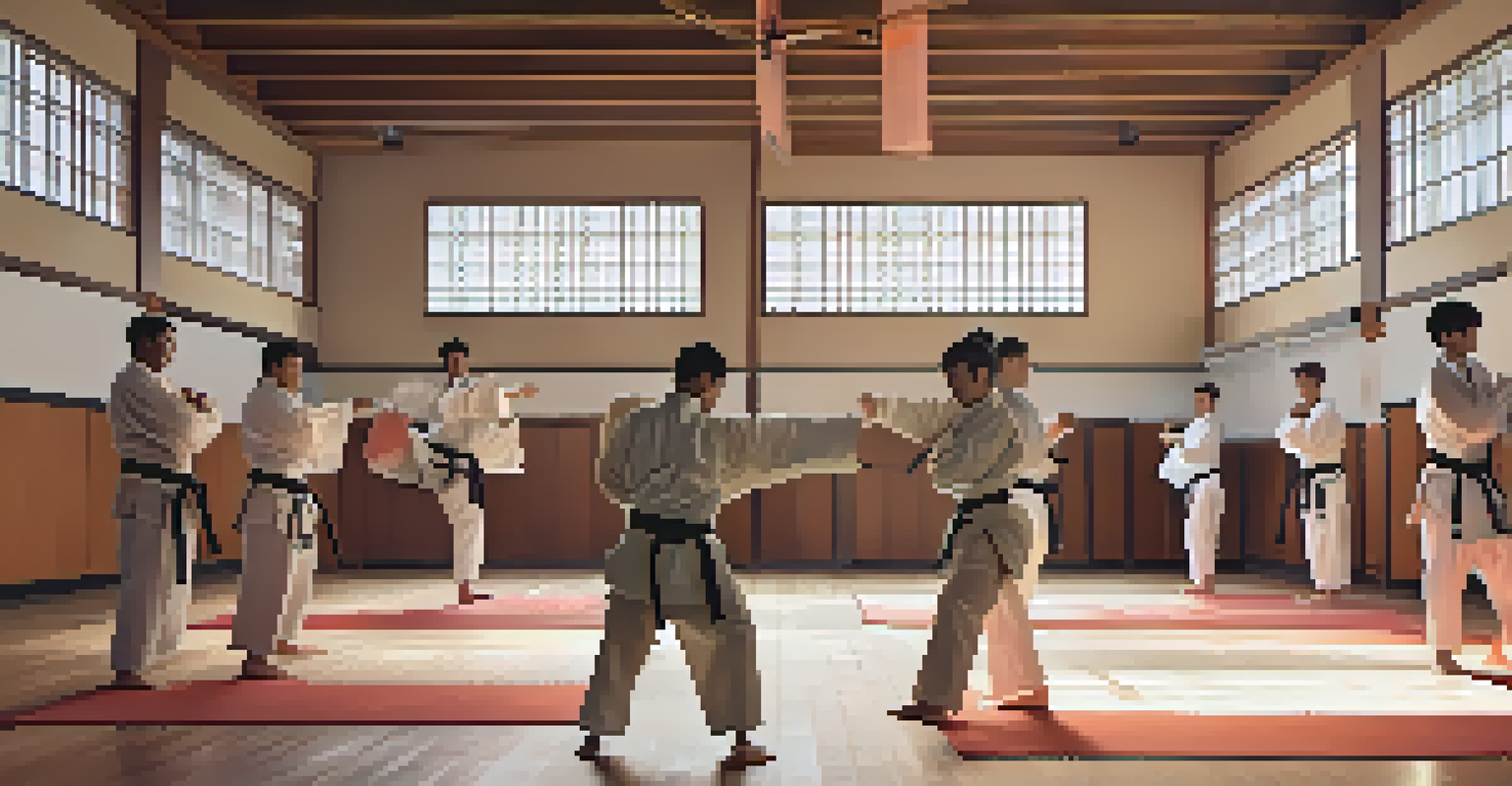Situational Awareness: A Key Benefit of Martial Arts Training

Understanding Situational Awareness in Everyday Life
Situational awareness refers to the ability to perceive and understand one's surroundings, making it essential for safety and decision-making. In everyday life, this might mean being aware of potential dangers in a crowded place or recognizing when a conversation is becoming heated. Developing this skill can be the difference between responding effectively to a situation or being caught off guard.
Awareness is like the sun; when it shines on things, they are transformed.
Imagine walking through a busy street. A person with high situational awareness would notice the cyclist approaching from behind, the dog running loose ahead, and the group of people engaged in a heated debate. They can assess these elements quickly and decide whether to change their path, slow down, or keep their distance. This keen perception doesn't just apply to potential threats; it also helps in identifying opportunities for positive interactions.
Martial arts training enhances this awareness by teaching practitioners to observe their environment actively and assess potential risks. The practice of being aware of one’s surroundings is not only beneficial in a dojo but also translates into everyday scenarios, making it a valuable life skill.
How Martial Arts Training Cultivates Awareness
Martial arts training involves rigorous practice that emphasizes focus, mindfulness, and responsiveness. During classes, students learn to pay attention to their own movements and those of their opponents. This heightened level of engagement trains the mind to be alert and aware of various stimuli in the environment.

For instance, while sparring, a martial artist must be attuned to their partner's body language and movements. This careful observation helps them anticipate attacks or defensive maneuvers, fostering a deeper understanding of situational dynamics. As a result, the student becomes adept at reading a room, whether in a martial arts setting or everyday life.
Situational Awareness Enhances Safety
Improved situational awareness helps individuals recognize potential threats and respond effectively, promoting personal safety in various environments.
Moreover, the discipline and concentration required in martial arts practice extend beyond the dojo. Practitioners often find themselves more aware of their surroundings in various situations, such as while driving, walking in a park, or even during routine interactions with others.
The Role of Mindfulness in Situational Awareness
Mindfulness is a practice that complements martial arts training and plays a crucial role in enhancing situational awareness. It involves being present in the moment and fully engaged with one’s surroundings. This mental state allows martial artists to respond more effectively to their environment, rather than reacting impulsively.
The most important thing in communication is hearing what isn’t said.
In martial arts, students learn to become aware of their breath, posture, and energy levels, which helps keep their minds focused and clear. This clarity aids in recognizing subtle changes in their environment, such as shifts in energy or movement patterns. By practicing mindfulness, martial artists cultivate a sharper awareness that can be beneficial in high-pressure situations.
The integration of mindfulness into martial arts practice not only improves combat skills but also enriches daily life. It encourages individuals to slow down and observe their surroundings, leading to informed decisions and enhanced personal safety.
Situational Awareness and Personal Safety
One of the most significant benefits of improved situational awareness through martial arts is enhanced personal safety. When individuals can accurately assess their environment, they are better equipped to avoid potential threats. This proactive mindset can be invaluable in various situations, from navigating unfamiliar areas to social interactions.
For example, a martial artist who has honed their situational awareness might notice suspicious behavior in a crowded venue and choose to reposition themselves or alert authorities. This ability to recognize and respond to potential risks can prevent dangerous situations from escalating and create a safer environment for themselves and those around them.
Martial Arts Boosts Confidence
Training in martial arts builds confidence as practitioners learn to assess risks and navigate social situations with ease.
Moreover, the confidence gained from martial arts training encourages individuals to trust their instincts. This self-assuredness can be a powerful deterrent against potential threats, as aggressors often target those who appear unaware or vulnerable.
Building Confidence Through Situational Awareness
As martial artists develop their situational awareness, they also build confidence in their abilities to handle various situations. This newfound confidence comes from the knowledge that they can assess risks and respond accordingly. It fosters a sense of control over one’s environment, which is empowering.
Imagine walking into a room full of strangers. A person well-trained in martial arts might feel more at ease, knowing they can read body language and assess interactions effectively. This confidence not only enhances their social interactions but also reduces anxiety in unfamiliar situations.
Ultimately, this self-assurance translates into everyday life, allowing practitioners to engage more fully without fear. With each training session, their awareness and confidence grow, paving the way for a more fulfilling, secure life.
Real-Life Applications of Enhanced Awareness
The skills learned through martial arts training extend far beyond the dojo. Enhanced situational awareness can be applied in various real-life scenarios, from handling workplace conflicts to navigating busy public spaces. It equips practitioners with the tools to assess situations critically and make informed decisions.
For instance, in a workplace setting, an employee with strong situational awareness may notice team dynamics shifting and proactively address potential conflicts before they escalate. This ability to sense changes in environment and behavior can foster a more harmonious workplace and improve collaboration among colleagues.
Mindfulness Aids Situational Awareness
Incorporating mindfulness into martial arts practice sharpens awareness, enabling individuals to engage more fully with their surroundings.
Additionally, in social situations, being aware of body language and group dynamics can facilitate better communication and relationships. This heightened awareness enables martial artists to engage more meaningfully with others, enriching their personal and professional lives.
Conclusion: The Lifelong Benefits of Martial Arts Training
In conclusion, martial arts training offers a wealth of benefits, with situational awareness standing out as a key advantage. By cultivating this skill, practitioners not only enhance their self-defense capabilities but also improve their overall quality of life. The ability to perceive and respond to one’s environment is invaluable in today’s fast-paced world.
As individuals engage in martial arts, they develop a keen sense of awareness that extends beyond physical practice. This awareness fosters confidence, improves personal safety, and enriches social interactions, creating a well-rounded individual ready to face life’s challenges.

Ultimately, the journey through martial arts is not just about mastering techniques; it’s about becoming more aware, confident, and equipped to navigate the complexities of life with grace.